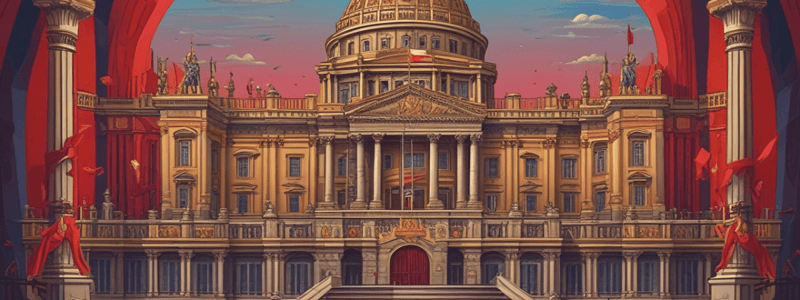Podcast
Questions and Answers
Which form of government concentrates power in the hands of a single person or small ruling elite?
Which form of government concentrates power in the hands of a single person or small ruling elite?
- Direct democracy
- Socialism
- Authoritarianism (correct)
- Classical republic
In which type of government does the state own and manage the economy?
In which type of government does the state own and manage the economy?
- Classical republic
- Socialism (correct)
- Direct democracy
- Monarchy
Which form of government allows citizens to vote directly on legislation?
Which form of government allows citizens to vote directly on legislation?
- Classical republic
- Monarchy
- Authoritarianism
- Direct democracy (correct)
Which of the following is an example of a country with a socialist government?
Which of the following is an example of a country with a socialist government?
Critics argue that authoritarian regimes may lead to a lack of focus on which issues?
Critics argue that authoritarian regimes may lead to a lack of focus on which issues?
Flashcards are hidden until you start studying
Study Notes
Forms of Government
Governments come in many different forms, each with its own unique characteristics and methods of operation. In this article, we will explore five main types of governments: Monarchy, Classical Republic, Authoritarianism, Socialism, and Direct Democracy.
Monarchy
Monarchies, also known as absolute monarchies, are systems where one person holds all power over the government. Monarchs often hold their positions through inheritance and rule for life. These governments existed throughout history, from ancient Egypt to present-day nations such as Saudi Arabia and Spain. There are several types of monarchy, including constitutional monarchy, elective monarchy, and congenital monarchy. While some argue that monarchy leads to stability and order, critics contend that it inhibits democratic development due to its concentration of power in the hands of a single ruler.
Classical Republic
Classical republics are based on the Roman Republic model, where citizens participate directly or indirectly in governing affairs. Characteristics include frequent elective offices, a separation of powers, checks and balances, and a constitution to limit the actions of elected officials. Modern examples of classical republics include the United States and Switzerland. Critics argue that the system can lead to political instability when the checks and balances do not function effectively.
Authoritarianism
Authoritarian governments concentrate power in the hands of a single person or small ruling elite. This form of government often suppresses individual freedoms and free speech. While there are many types of authoritarian systems, they generally operate under the principle that maintaining order and obedience is more important than allowing dissent. Examples include China, Russia, and Iran. Critics argue that authoritarian regimes lead to a lack of transparency and can neglect issues like education and healthcare, focusing instead on internal and external threats.
Socialism
Under socialist governments, the state owns and manages the economy. Some forms of socialism feature worker ownership, while others put more emphasis on the public provision of goods and services. This system of government is seen as helping to reduce income inequality but has faced criticism for leading to a lack of innovation and slow growth. Examples of countries with socialist governments include Cuba, Venezuela, and North Korea.
Direct Democracy
Direct democracies allow citizens to vote directly on legislation, rather than voting for representatives to pass laws on their behalf. Smaller nations, such as Switzerland and Iceland, practice direct democracy to varying degrees. Proponents argue that this form of government is more transparent and responsive, but critics contend that it may not scale effectively to larger populations.
Each of these forms of government brings unique advantages and disadvantages, and no single one can claim universally superior performance. Governments evolve over time, often borrowing elements from each other to create hybrid forms. As societies develop and change, the type of government they adopt can shape their future trajectory, for better or worse.
Studying That Suits You
Use AI to generate personalized quizzes and flashcards to suit your learning preferences.




